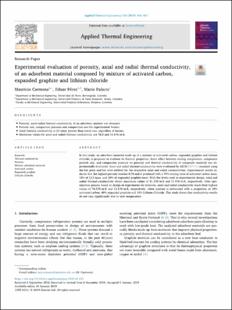Experimental evaluation of porosity, axial and radial thermal conductivity, of an adsorbent material composed by mixture of activated carbon, expanded graphite and lithium chloride
...
Carmona, Mauricio | 2019-03-05
In this study, an adsorbent material made up of a mixture of activated carbon, expanded graphite and lithium chloride, is proposed to evaluate its thermal properties. Ratio effect between mixing components, component particle size, and compaction pressure on porosity and thermal conductivity of composite material was experimentally evaluated. Axial and radial thermal conductivity were evaluated by ASTM C177-13 standard using the hot plate and hot wire method for the respective axial and radial conductivities. Experimental results indicate that the highest porosity reaches 0.78 and is produced with a 70% mixing ratio of activated carbon mass, 10% of LiCl mass, and 20% of expanded graphite mass. With the levels used in experimental design, axial and radial thermal conductivity obtain maximum values of 51.2 W/m K and 11.9 W/m K, respectively. After optimization process based on design of experiments for mixtures, axial and radial conductivity reach their highest values of 76.5 W/m K and 13.8 W/m K, respectively, when mixture is elaborated with a proportion of 30% activated carbon, 40% expanded graphite and 30% Lithium Chloride. This study shows that conductivity results do not vary significantly due to tests temperature.
LEER










